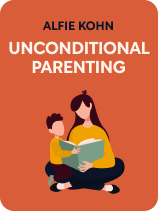

This article is an excerpt from the Shortform book guide to "Unconditional Parenting" by Alfie Kohn. Shortform has the world's best summaries and analyses of books you should be reading.
Like this article? Sign up for a free trial here .
Which forms of discipline are good for children? What do experts say about punishing your kids?
According to author Alfie Kohn, good discipline for children relies on unconditional support and acceptance, not rewards and punishments. Kohn’s book, Unconditional Parenting, has received praise for its rejection of mainstream parenting techniques, choosing compassion in the face of bad behavior.
Keep reading to learn Kohn’s advice for learning good discipline skills that will help children, not harm them.
Kohn: Why Good Discipline & Punishments Don’t Mix
Kohn argues that any system of rewards and punishments (and their close relatives, bribes, and threats) is ultimately destined to fail both parent and child. Specifically, these are not good discipline techniques for six reasons:
1. They send children the wrong message. Conditional parenting techniques teach children that:
- You only love them when they behave well.
- Compliance is more important than independent thinking.
- Their parents’ approval is more important than their own desires.
2. They make children self-interested. Rewards, punishments, threats, and bribes make kids selfish because these techniques cause them to focus on the consequences to themselves rather than on the consequences to others.
3. They’re manipulative and disrespectful. Rewards and punishments are designed to control children. They trivialize kids’ own desires and points of view in a way that you’d never consider doing with another adult.
4. They’re rooted in behaviorism, an outdated psychological theory that’s inappropriate to use with human children.
5. They don’t work. Rewards, punishments, bribes, and threats might “work” as good discipline for achieving compliance in the short term, but in the long term they’re ineffective and often backfire. In fact, children whose parents don’t offer rewards and punishments are more likely to comply when their parents do ask them to do something.
6. They have damaging long-term effects. Kohn cites studies showing that children whose parents use “control techniques” end up with poor self-esteem and depression and may even be more likely to commit crimes.
| Conditional Parenting Techniques: Are They as Damaging as Kohn Thinks? Unconditional Parenting came out in 2005, when there wasn’t a lot of hard evidence for or against rewards and punishments as disciplinary techniques. Some research that’s been published in the interim does seem to support Kohn’s case—for example, there’s now evidence that unpredictable and severe parental discipline alters the structure of children’s brains and that good discipline (or positive parenting) improves children’s emotional and behavioral control. However, the research on parental discipline is plagued by bias and unreliable methods. One problem is the near impossibility of doing randomized controlled trials in parenting research (most parents would, understandably, object to having to change how they interact with their kids just because they’re assigned randomly to an experimental group). This means that most of the studies rely on correlations, making it hard to be sure about causality. For example, it’s entirely possible that parents might behave more punitively with children who act out constantly and more sensitively with children who are kind to them. There may be other factors, too—for example, aggression may have genetic components, and even seemingly unrelated things like language competence change how parents respond to their kids. Kohn draws a lot on his own parenting experience throughout the book, and it could be that this approach worked with his children because they were already less inclined to act out. It does seem that kids who are more difficult for adults to deal with (for example, those who’ve been diagnosed with oppositional defiant disorder) comply more if they’re given clear instructions, time-outs, and other even stronger disciplinary measures. But this, of course, doesn’t answer Kohn’s question about whether gains in short-term compliance are worth potentially damaging the relationship in the long term. |
Exercise: Rethink a Past Punishment
Unconditional parenting is about doing away with rewards and punishments completely. Think through how you might use Kohn’s advice for good discipline in practice.
Think of a punishment you’ve experienced in your life. This can be either a punishment you’ve doled out as a parent or one that you received as a child.
- Describe what happened. What behavior was being punished? What was the punishment?
- Was the punishment effective? Why or why not?
- Based on Kohn’s unconditional parenting principles, what might have been an alternative? (For example, could the behavior have been prevented ahead of time by setting limits or controlling the environment? Could it have been dealt with more calmly and wisely in the moment?)

———End of Preview———
Like what you just read? Read the rest of the world's best book summary and analysis of Alfie Kohn's "Unconditional Parenting" at Shortform .
Here's what you'll find in our full Unconditional Parenting summary :
- How to raise kids to be self-confident, independent, and compassionate
- Why you should throw away the standard parenting rulebook
- Why rewards and punishments cause more harm than good






